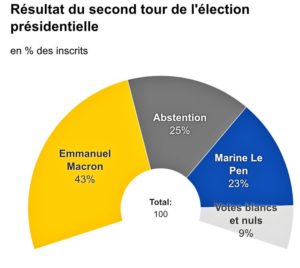Dear foreign friends, here's why some of us are not thrilled by Macron's election
On Sunday evening, when it was announced that Emmanuel Macron was elected President of France, there was a big gap in reactions between French people and the others on social networks: lots of foreigners were congratulating us (even pop culture idols such as Mark Hamill or Zach Braff) but among the French people, we also saw many resigned and blasé reactions (notice that « blasé » is a French word…). And it is kind of weird being congratulated for something you’re not proud of. Let me try to explain you why.
Yeah! We beat Le Pen! But did we?
First of all, let’s evacuate this: YES, we are glad Marine Le Pen won’t be our president, we won’t have to suffer her policies based on rejection and hatred of the foreigners and on inhibited nationalism. She surely would have been dangerous to a lot of people in the country and her election would have had terrible consequences in general (she’s like our own personal Donald Trump, which says a lot).
The only problem is that, though she did not win, there are good chances nothing will be solved by Macron: the 11 million people who voted for Le Pen aren’t going to magically dissolve after this election. And the worst thing is: most of the reasons why Le Pen’s score is so high are precisely the result of policies that Macron defends.
First of all, you have to understand that people who voted for Le Pen are not all racists and nationalists (thankfully). Most of them are just people who see their standard of living challenged by globalization. And when Le Pen talks about protecting them from this (even by stealing some economical principles that were theorized by the left wing), they hear it. Michael Moore said the same thing about Trump’s election, and I think he’s right.
It’s easy to see, for example, that cities voted largely for Macron (90% in Paris) while on the countryside, Le Pen dominated and sometimes got huge scores (even 100% in some village). Even in regions were immigration is low if it’s not nonexistent. And it’s easy for people in the cities to think « oh, those uneducated racist peasants » and shove the problem under the rug, as it’s easy for winners of globalization to gladly encourage it. Oh, and I’m a young male computer engineer, so don’t worry for me: I’m one of the winners. But contrary to Macron and some of my relatives, I don’t believe France is just made of young dynamic executives.
« When Le Pen talks about tradition and cultural heritage of France, you bet they listen. »
People in the countryside know that in their villages, they used to have schools; they used to have post offices; they used to have doctors; they used to have little local shops; they used to have powerful and efficient public services and companies. Oh, and the state’s budget was balanced. There’s some idealization here, but not that much.
Now their kids have to take buses for ages to reach the closest school which has overcrowded classes; they have to take the car to post a simple letter; they pray that they don’t have a heart attack as hospitals are closed and merged one after the other and full of burnt-out nurses; they realize that what’s been privatized has become more expensive and doesn’t work better when it’s not become worse (highways, electricity, railroads…).
And for the shops, well, they can rely on the mushroom gigantic ugly malls which are built everywhere in the suburbs, turning the fields into massive parking lots. These cold inhuman consumption temples that kill all little shops around and erase the cultural specificities of France’s regions. So when Le Pen talks about tradition and cultural heritage of France, you bet they listen.
People are not anti-Europe by essence of by dogma: they are because they see that the EU has lately mainly been about freeing the market, not the people. That it’s been about putting Europeans in competition with one another, leveling down the standard of living to the poorest European countries instead of leveling up the social protection to the wealthiest ones. If you ask people, they’re all in favor of the union of all people and of eternal peace between countries, but they are not idiots: they realize that people leading the EU are using these aspirations as an excuse to push their liberal vulture capitalist agenda.
I’m pro-Europe, but let’s face it: the Europe promoted by Macron and many other pro-Europe politicians is the best weapon against Europe itself. You can’t expect people to support a policy that results in austerity and economic insecurity for them. You’re allowed to be glad France did not follow United Kingdom after the Brexit, but Europe has not suddenly become popular again with Macron’s election. You want people to support Europe? Make a Europe that supports people.
No, Macron is not « something new »
And what is Macron compared to this? Macron is a pure product of the system that created these situations. I’ve read in many foreign articles that Macron was « something new », a « wind of change » on French politics. At this point, it’s not fake news: it’s bullshit.
Let me sum this up for you: Macron has attended ENA, a school which about 90% of our politicians attended (they are so copy-pasted one after the other that we even have an expression for them: « énarques »); he was a minister under last president François Hollande and pretty much inspired his economic policy; he worked as a banker at Rothschild, so he was not really out of the (capitalist) system but rather at the top of this system; and the cherry on the cake, he’s supported by half the dinosaurs of politics that have had power in France since before he was in high school.
« How is voting for gasoline “blocking” the fire? »
So he’s young? Yeah, big fucking deal. Macron’s project is the continuation of what’s been done in our country for thirty years: reducing the worker’s right, reducing social protection, increasing the pressure of competition on people by making free-trade agreements with countries whose labor code is a joke. As if there was anything to win in trying to be « competitive » with Chinese or Bangladeshi workers. Macron’s project is exactly what brought 11 million people to Marine Le Pen.
That’s one of the reasons many left-winged people (including me) were reluctant to vote Macron to « block » Le Pen: how is voting for gasoline « blocking » the fire?
But Macron has won fare and square, right?
That’s another part which made people reluctant to vote Macron and even angry at this: the way this election was rigged. For about a year, almost all mass media have been massively campaigning for Macron.
As a self-fulfilling prophecy, a year saturated with surveys and of articles pro-Macron made lots of people vote for him, not by conviction, but because they thought he was the « most suited to win », whatever this means. A survey showed that only 60% of the people who voted for Macron at the first round did it by conviction, opposed to 80% for every single other candidates.
Simultaneously, the Front National (party of Marine Le Pen) was also given a wide media coverage, making it the protest choice by default. The ambition, barely hidden, was to have this second round Macron-Le Pen. This second round is very handy, because while Le Pen does oppose to the crude liberalism of Macron (well, sort of: she doesn’t mind liberalism if it’s restricted inside France’s border), she builds that on hyper-conservatism, xenophobia and Europhobia. So of course, many people (like me) won’t ever even consider voting for her because they support a fair, democratic and decent opposition to liberalism.
And of course, the very same media who gave voice to the Front National for months were peremptorily demanding people to put out the fire they create.
For several years now, Le Pen and the Front National has been a weapon that media and other parties use against democracy: put anyone against the FN in an election and he or she’s almost sure to win it. And once they know that they can organize this impossible choice, mass media just need to present one candidate as the only reasonable choice (preferably the one that serves the interests of the owners of these mass media), let the FN have most of the speaking time left and it’s done.
« Even François Hollande, the President of the French Republic who calls himself a socialist, got out of his reserve and warned people against Mélenchon, a left-winged candidate. »
Just look at what happened when another candidate was starting to get more and more favorable reviews: Jean-Luc Mélenchon, who is also anti-liberalism but with principles based on ecology and democratic revision instead of xenophobia and hyper-conservatism (with the ambition of convoking a constituent assembly to reform our badly-working republic). For the record, the guy was supported by a large majority of NGOs or by people like Noam Chomsky. But as soon as there was a chance he reached the second round, all mass media unleash the dogs on him, accusing him of being a stalinist or of wanting to create a second Venezuela in France.
Even François Hollande, yes, the President of the French Republic who calls himself a socialist (what a joke), got out of his reserve and warned people against Mélenchon, a left-winged candidate, and never raised a finger against far-right Le Pen who’d been announced as winner of the first round for ages. Why? Because contrary to Le Pen, Mélenchon was a real threat to Macron.
Don’t get me wrong, Mélenchon was not a messiah and sure there were some debatable points in his program. But he was the voice of a rational and positive opposition to liberalism, one that could confront with Macron’s vision. In any case, if Mélenchon had been in the second round, he might have lost too, but maybe not: and believe me, the debate between the two rounds would have been something else than the stupid cat-fight we got with the dumb clown Le Pen against Macron.
How long will this hold?
Le Pen’s father was at the second round of the presidential election fifteen years ago and we played the same game: people voted for Chirac to block Le Pen even though many had no sympathy at all for Chirac. Chirac had more than 80% of the votes. You’d think he would have applied a policy to fix this French society and listened to the people’s protest? Wrong. He did his right-winged policy as if 80% people voted for him by conviction. And it’s very likely Macron will do the same.
The thing is, this strategy is becoming dangerous: electors are understanding exactly what’s going on and they are less and less keen on participating in this farce. Chirac scored 80% in 2002, but Macron « only » had 66% of the votes against Le Pen in the second round, with a record of abstention and blank votes. While Le Pen almost had twice as many electors as her father fifteen years before, Macron had less people who agreed to vote for him against their own convictions.
Sadly, there is good chance this will not go better in the near future: nobody in the higher circles seems to want to put an end to this dangerous game and in five years, Le Pen might just end up winning for real (if things don’t go bad before).
In the mean time, Macron will apply his liberal policy as if all was well. Him and the media will keep hammering « THERE IS NO ALTERNATIVE » to any criticism against it. More and more people will have nothing to loose in giving in to any kind of vote that says « enough! ». I do not see this ending well.
So in the upcoming months, you might hear that there are once again strikes in France. And before you start joking about how we are always on strike, think that we’re trying to protect our social model against yet another attack, and that we are alone, with most of the French media and political powers against us.
Our social model has been our strength for all the second half the XXth century, leading for example to a world reputed healthcare system. And this social model was put in place just after the Second World War, at a time when the country was devastated and ruined (here’s for the « we can’t afford it »). And it’s not outdated or unadapted: one reason French people suffered less than many others from the subprime crisis in 2008 was precisely the robustness of this social model. And I know we have the reputation of surrendering easily, but know this: we won’t let it die without a fight.

Reflections and, often, rants: I give my opinion and analysis on social issues, politics, democracy, etc. The pot represents both the stew of ideas and the container that overheats and eventually boils over...
Support
This blog is published under a free license and may be freely copied, shared, modified, and reused. It is free of charge because it is primarily funded by your donations. You can support me very easily without registering:



